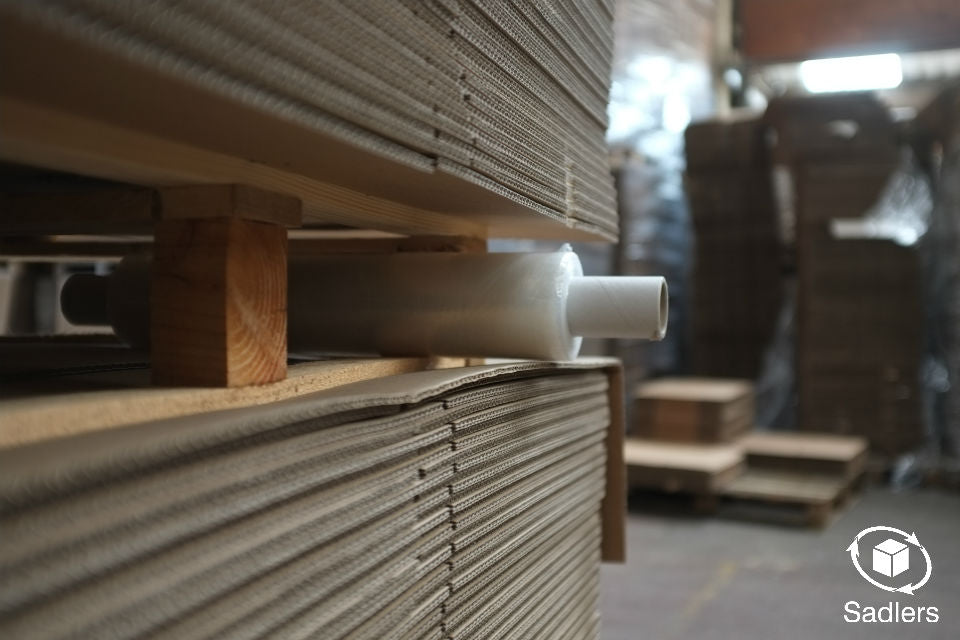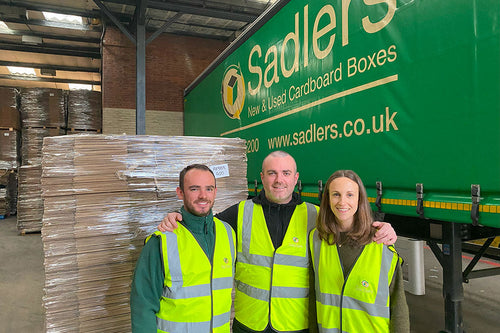How to make more money from recycling cardboard waste

Note: This is a guide for businesses that produce large volumes of cardboard waste. If you are a shop or an individual with boxes to sell, we recommend using Facebook marketplace.
----
Zero Waste to Landfill targets mean that those companies producing large amounts of waste in the UK have an obligation to recycle their waste materials. When it comes to used cardboard boxes, they are often baled and recycled, and this provides a small amount of revenue for the producer of the waste while meeting environmental targets and requirements.
There is a more profitable way
What if there was a different way of managing cardboard waste that paid much more than recycling, and was much more environmentally friendly too? There is. Do you recycle large quantities of boxes that are a uniform size? If so you may be eligible for the Sadlers cardboard box reuse scheme; a well-established and innovative method for diverting cardboard waste to reuse that not only helps you to become more sustainable but provides a higher revenue stream for your company.

What's wrong with baling boxes?
Baling only really makes sense for companies who need to discard lots of different sizes and types of used boxes. This is because it is too time-consuming to sort the boxes in these types of scenarios, and quantities may be too low to make transporting them in one piece viable. One example would be a local supermarket or corner shop, where many different types of boxes are unpacked in order to stack the shelves with various products from different manufacturers. The variety of boxes would make it hard to manage anything other than baling, so it is the logical option. But in a factory for example, where there are large, uniform and regular supplies of cardboard boxes in need of recycling, baling is actually wasteful when there is a simple way to sort them and divert them to the reuse market.

Why is baling wasteful in certain situations?
A cardboard box that is baled and sent off to a recycling centre must be transported (fossil fuels/oil, CO2 emissions), pulped down (fossil fuels/energy, water, CO2), remade (new paper resources, CO2, fossil fuels/energy) and transported three times more (to warehouse, to customer and to end user). Diverting to reuse avoids the unnecessary requirement for water use and paper materials (trees) while significantly reducing CO2 emissions and fossil fuel usage.

"We have systems in place and don't want to / can't change"
This is a common objection, and one that comes from a place of fear: what if our old way of doing things is better? What if I get blamed for causing problems? Is it worth it?
These questions can be reframed. Is it ok to say "but we've always done it this way" or is it better to say "is there a better way we can do this?" Instead of worrying about creating waves, think of the acclaim when revenues increase and sustainability teams thank you for finding such a simple way to reduce environmental impact.
"Can you help us integrate a new system like this or do we have to figure it out ourselves?"
We don't just come and take away your boxes, we help you to implement the changes you need. We have exceptional knowledge, experience and the infrastructure to make the scheme a success with everyone we work with. We have helped huge, multinational, multi-site companies successfully divert their cardboard boxes to reuse while allowing them to reap the financial rewards that stretch far beyond any given by recycling companies and paper mills.
Find out more by calling us on 0121 772 5200 or enquire online and we'll get back to you. BUSINESSES WITH LARGE VOLUMES ONLY, THANK YOU.

Author: Lauren Sadler
Author Bio: Lauren holds an MSc. in Sustainable Development and enjoys writing articles on a range of subjects related to the environment. She is particularly interested in waste reduction, corporate social responsibility (CSR) and sustainable community projects.
Featured Articles

December 03, 2025
Options for Recycling Cardboard Boxes
How to recycle cardboard waste: a guide for business and the home The principles of recycling have b...

November 27, 2025
We are WINNERS of a National Recycling Award!
We're thrilled to announce a big win at the MRW National Recycling Awards 2025! Our pioneering cardb...

October 08, 2025
We’ve been shortlisted for the National Recycling Awards!
We’re excited to announce that we’ve been shortlisted in the circular economy category at the Nation...

July 17, 2025
Sadlers becomes Sustainability West Midlands Member
Back in February this year we made the decision to join the Sustainability West Midlands network whi...